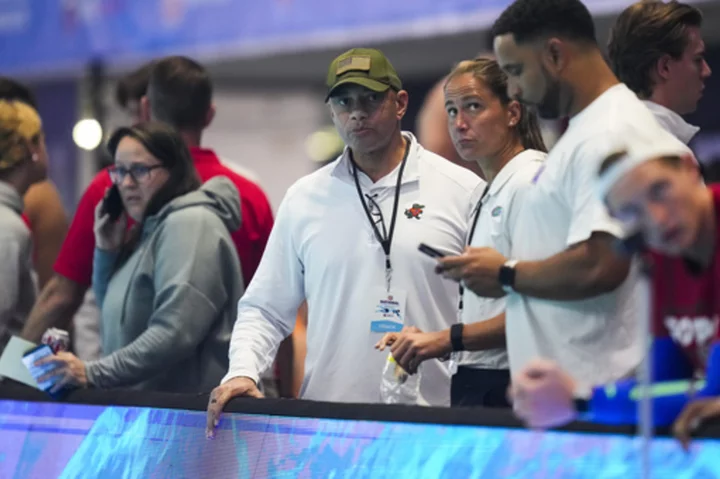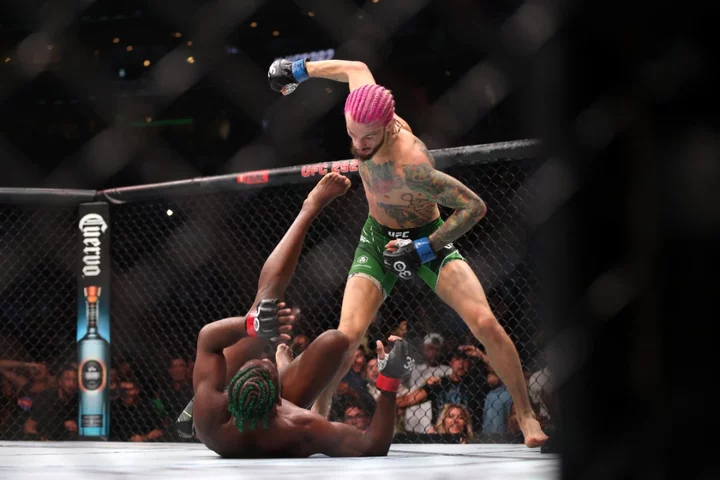INDIANAPOLIS (AP) — In a sport still struggling to diversify, Anthony Nesty is a significant presence on the pool deck at the U.S. national championships.
He overcame long odds to win an Olympic gold medal.
He worked his way up to become one of America’s top swimming coaches.
And he’s Black.
“You know you're a role model,” Nesty told The Association Press. “You have to take that very seriously. Maybe it's why I work so hard at what I do. I try to be the best Anthony Nesty I can be."
Nesty is the head coach at the University of Florida and oversees one of the top pro teams in the country, a star-studded group that includes Olympic gold medalists Katie Ledecky, Caeleb Dressel and Bobby Finke.
When Ledecky went looking for a new team after graduating from Stanford, she couldn't help but be impressed by the results Nesty was producing out of Gainesville.
Dressel won five gold medals at the Tokyo Olympics. Finke, a relative unknown on the international scene, swept the 800- and 1,500-meter freestyle events.
Ledecky has fit right in with Nesty's program.
“She's a true Gator now,” the 55-year-old coach said proudly. “She's all in.”
Nesty encouraged Ledecky to become more involved in her training program, to push back when she's not happy about something the coach wants her to do.
It's been a bit of an adjustment for Ledecky, but Nesty has helped her navigate through it.
“Of course, there are ups and downs and days that make you a little worried,” Ledecky said. “But Coach Nesty always knows how to calm me down and knows how to develop a plan for all of us, a season plan. You just go in every day and give your best effort and you know that the results are going to be there at the end of the season.”
While most of Nesty's swimmers come from more traditional swimming backgrounds, he took a lane far less traveled.
A native of Trinidad and Tobago, he moved to Suriname — a tiny nation on the northern coast of South America — before he was a year old.
Like most of his friends, Nesty longed to play soccer. But his late father, Ronald, wanted him to take up a sport where he'd be on his own.
“He was real high on the discipline aspect of an individual sport,” Nesty recalled. “So I went to swim lessons and that was it.”
It wasn't love at first splash.
“I was just like any other kid. It's like, ‘Why am I swimming? I could be playing soccer or basketball or something else,'” Nesty said. “But my dad was a big believer in discipline. He knew that to be successful in anything you did, it's imperative to be very disciplined.”
Nesty rose quickly through the swimming ranks, earning a spot at the 1984 Los Angeles Olympics when he was just 16. Four years later, after moving to Florida to train and attend school, he arrived in Seoul as one of the world's top butterflyers.
Standing in his way was one of the greatest swimmers ever, Matt Biondi, who had set his sights on matching Mark Spitz's then-record of seven gold medals.
In one of the sport's greatest upsets, Nesty beat Biondi by one-hundredth of a second in the 100 fly — an especially momentous accomplishment for a swimmer of color. He was the first male Black swimmer to capture an Olympic gold medal. He remains the only gold medalist from Suriname, a country of less than 1 million residents.
“It's just an amazing story,” Nesty said, still sounding a bit incredulous all these years later. “Whether it was being in the right place at the right time or just luck or just God-given talent that I, of course, had, it's a unique story, that's for sure.”
Nesty was a national hero in Suriname and returned for one more Olympics, capturing the country's only other medal with a bronze in the 100 fly at the 1992 Barcelona Games.
Now, when he's on deck as a coach, there are kids of color who surely feel more empowered to give swimming a try, even though it remains a largely white sport.
“I remember the first time I saw a Black official at a meet,” said Seren Jones, founder of the British-based Black Swimming Association. “I actually started crying. That reaction surprised me a bit, but there is such a starvation of role models for Black swimmers. I never had one."
Having someone such as Nesty to look up to, she added, is “massive for the sport.”
In an era when swimming for a living just wasn't a realistic option, Nesty had to find something else to do after graduating from Florida.
Once again, it was his father who helped set a new course.
“I graduated and my dad said, ‘Son, you on your own,’” Nesty said, chuckling.
He moved into coaching, starting out at his former high school in Jacksonville, then moving to a club team in Sarasota before returning to the college ranks at Florida, where he learned the ropes under his former coach, Gregg Troy.
Nesty knew coaching would give him a chance to influence even more kids to follow their dreams.
“I grew up in Suriname, a third-world country, and made it to the pinnacle of the sport,” he said. “That's kind of a cool story. I want to potentially coach kids that have the ability and a chance to get to that level.”
Troy, one of the toughest guys ever to coach the sport, certainly had an impact on Nesty's methods. Discipline — there's that word again — and high standards remain hallmarks of the Florida program.
When Nesty served as coach of the U.S. men's team at last year's world championships, he gave those outside his program a glimpse of his steely intensity at one of his first meetings.
“We don't lose relays. We don't lose swim-offs. We're here to win gold medals,” he barked at his team, according to Kieran Smith, another Nesty swimmer who medaled at the Tokyo Olympics.
“It seemed like a normal meeting to me,” Smith went on. “And then we got out of the meeting and all the guys came up to me and they're like, ‘Is he usually like that? Is that normal?’ And I'm like, ‘Yeah, that’s pretty standard.'”
Nesty points to another trait that has served him well as a coach.
“A good friend of mine once said, ‘The thing about Anthony is he’s always planning.'” the coach said. “You have to manage staff, you have to manage the athletes, you have to manage the deck. Multitasking is at a premium, especially in our program. With the quality of athletes that we have, you have to be able to multitask. I'm pretty good at that."
Nesty no longer dwells on his swimming career, as groundbreaking as it was.
“Now,” he said, “it's all about getting others to race at the highest level.”
___
Paul Newberry is a national sports writer for The Associated Press. Write to him at pnewberry@ap.org
___
AP sports: https://apnews.com/hub/sports and https://twitter.com/AP_Sports









